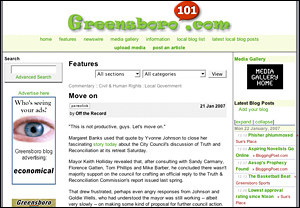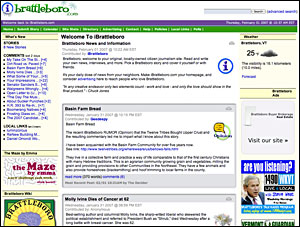
Greensboro101
All these sites, even those with heavy doses of Big-J journalism, draw on the community brain. They depend for their vitality on citizens sharing their thoughts, observations and experiences. Subjectivity prevails. One reason sites are so different from one another is that towns are so different, and sites reflect the citizens’ preoccupations. The county fair will generate outpourings of photos and contributions in rural New Hampshire, while in San Diego people can’t say enough about the price of real estate.
Another commonality is emerging: Citizens for the most part do not desire to contribute fully reported articles with leads, middles, and ends, or to communicate their experiences in polished essay form (though some do; many sites boast volunteer columnists). In a few cities, such as Madison, Wisconsin, professionals are trying to train citizens to become journalists. But there is little evidence that many civilians want to call around and conduct interviews (again, with exceptions; the blogger who created Greensboro101.com did start making calls after an editor at the Greensboro paper made that suggestion in a post to the site). In fact, sites such as New West and Village Soup struggle to generate user posts, in part, their founders suspect, because citizens are intimidated at putting their prose up next to professional copy.
Citizens for the most part do not desire to contribute fully reported articles with leads, middles, and ends.
Citizens are, however, using community sites to bring attention to critical issues or to have their say on growth, crime, jobs, schools and the environment. They also stir up talk about lifestyle, noise, traffic, and who sells decent produce. Their approach is more often impressionistic than systematic, or what journalists would consider “finished.”
They go to public meetings and post a paragraph of interpretation, or skip the reporting and go straight to analysis. Some will post transcripts or documents or raw video or audiotape. Or they’ll report from experience, adding their account of something happening on the block or at their kids’ schools to the story mosaic taking shape on site. “Citizen journalists have an outsider stance to the news,” said H2otown‘s Lisa Williams. “They creep up on the news,” for example by blogging about meetings they watch on local cable channels.

ibrattleboro
Though in this experimental phase each site is sui generis, sites commonly make room for whatever kind of user wants to join the party. Certain types are showing up all over: The local official or politico who blogs; the suffering commuters who want road improvements; the development debaters; the gallery and club owners touting weekend events; the guy who posts 20 photos of his sandy baby; and the high school clubs washing cars on Saturday.Many non-journalists who have launched sites, such as Barry Parr, founder of Coastsider.com, and Chris Grotke and Lise LePage at ibrattleboro, have assigned themselves to cover specific issues, but they do it on terms that don’t necessarily follow the rules of standard journalism. Parr doesn’t have to give a blow-by-blow account of a municipal meeting in cases where he’s set up his tripod and made the full video available on the site.
Sites often crackle with postings when towns experience big events: A hailstorm, a Nazi rally (as occurred in Olympia, Washington), a momentous issue that comes before the council or school board.
People also use hyperlocal sites to explore: What’s that smell? Why was there another stabbing this weekend? Can someone baby-sit my parrot? And no one responds that the smell is too speculative, the stabbing is worth just a couple of paragraphs, or that interest in a parrot is too inside to be published.
